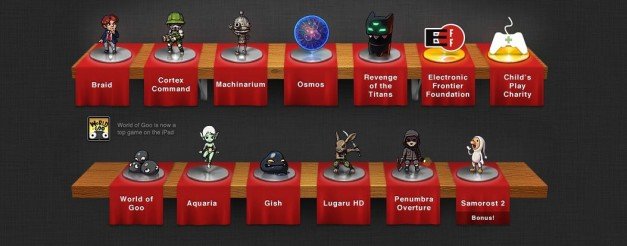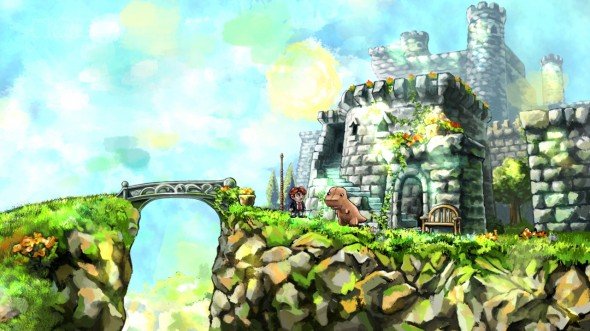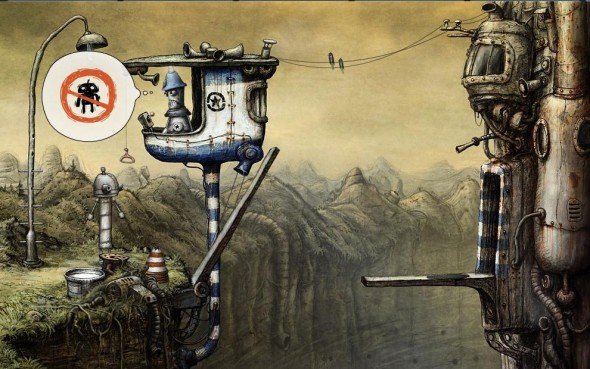
So far the best deal this correspondent has been offered in San Francisco was a nice tramp who wanted to sell an electrical heater he was dragging behind him for ten dollars. It was amazing deal, a humble offer and (technically) would benefit charity – but was unlikely to come with immaculate customer support, or indeed a copy of Braid.
Opening this year's fist-in-the-air indie movement at GDC was a detailed breakdown of the success of the Humble Indie Bundle – with the concept's progenitors John Graham and Jeffrey Rosen of Wolfire games providing the masses with hot statistics amidst jpegs of Sad Keanu and a video of a man (labelled Ubisoft) falling into a pond while his dog (labelled Pirates) looked on disdainfully.
For the uninitiated last May's Humble Indie Bundle was a downloadable game collection featuring World of Goo, Aquaria, Gish, Penumbra: Overture and Lugaru. It's follow-up came in December, featuring Braid, Cortex Command, Machninarium, Osmos and Revenge of the Titans. All the above were made available over PC, Mac and Linux for a limited time, for whatever price you wanted to pay, with a charity donation and the (fulfilled) promise of some of the games being released open source if a million bucks in sales was hit.
Read on for the details...

The statistics that roll in from the project are fascinating, kicking off with the base-line fact that thus far the project has banked $3m dollars, and given a cool million to charities Child's Play and the Electronic Frontier Foundation. “I remember calling the EFF and gave them a complicated pitch” laughs Jeff Rosen during the presentation. “After about ten minutes they interrupted and said 'so you're asking us if you can give us money?”
Did you know that statistically Hotmail users are stingier than the cool kids on Gmail? Well, according to the Humble guys this is a rock solid fact. In terms of prices paid, the first Indie Bundle had 9000 purchases with people donating a measly penny, with 30,000 people plumping for a far more reasonable $10 or so – with a few stand-out heroes/crazies donating colossal figures like $3333 and, of course, $1337. In Wolfire's own words “generous people overpowered the cheapskates”.
More distressingly, despite the underlined fact that “In general the internet is pretty nice”, the Humble Bundle was a target for both pirates and nasty-types willing to jump on its hype train. One chap bought 1000 copies of the initial bundle at one cent a go, and another bought the second batch 1736 times at the same insulting price-point - presumably with the potential of later eBay resales in mind. This was “pretty damning to the averages on the site, and pretty annoying” – especially when coupled in with the 25% of people directly pirating the download and more through activity on torrents. One nasty schemer even registered www.wolffire.com (note the two 'f's) with the intention of siphoning money into a personal paypal account – which thankfully was shut down before it did any damage.
The biggest gaming news, reviews and hardware deals
Keep up to date with the most important stories and the best deals, as picked by the PC Gamer team.
A heart-warming result of the piracy, however, was the discovery that many pirates lived in countries where credit card transactions and paypal were hard to come by – leading to people actively buying the bundle for strangers in need. Rosen himself bought 25 copies for those wanting a slice of humble pie.

In fact, the lasting impression left on the audience during the Humble Pie talk was the sheer effort put into customer service. Under the motto 'No Customer Left Behind' a team of 18 operators, many of them the game devs themselves, pulled all-nighters – manning email accounts and directly responding to the 0.5 percent of people affected. There was even a tab on the site in which concerned punters could get in touch directly, the screens of the Humble customer service team cascading with chat windows. “It's like Starcraft. You just feel it.” runs the explanation for how it feels operating in such a direct customer feedback loop. Wolfire also aren't backward in criticising the services they consider to misunderstand the needs of the download customer – labelling the Good Old Games faux-closure of last year as “a stunt at the customer's expense”.
Overall John Graham and Jeffrey Rosen outlined the strategies and ingenuities of their schemes in front of an assembled group of appreciative peers – their success something of a heart-warming triumph. As for Humble Bundle #3? No news as yet – but the bundle will be “cooler” and the customers “happier”. The wait starts now…
PC Gamer is the global authority on PC games—starting in 1993 with the magazine, and then in 2010 with this website you're currently reading. We have writers across the US, Canada, UK and Australia, who you can read about here.


